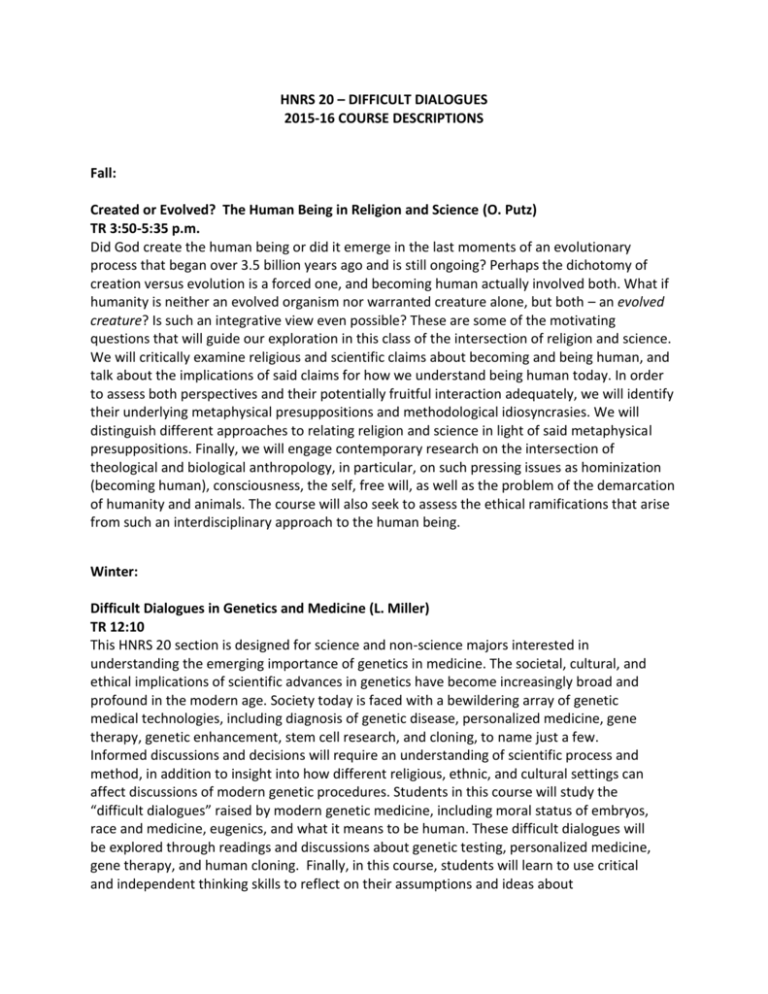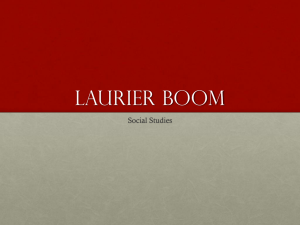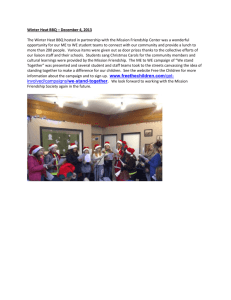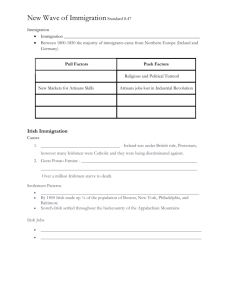2015-2016 HNRS 20 Courses
advertisement

HNRS 20 – DIFFICULT DIALOGUES 2015-16 COURSE DESCRIPTIONS Fall: Created or Evolved? The Human Being in Religion and Science (O. Putz) TR 3:50-5:35 p.m. Did God create the human being or did it emerge in the last moments of an evolutionary process that began over 3.5 billion years ago and is still ongoing? Perhaps the dichotomy of creation versus evolution is a forced one, and becoming human actually involved both. What if humanity is neither an evolved organism nor warranted creature alone, but both – an evolved creature? Is such an integrative view even possible? These are some of the motivating questions that will guide our exploration in this class of the intersection of religion and science. We will critically examine religious and scientific claims about becoming and being human, and talk about the implications of said claims for how we understand being human today. In order to assess both perspectives and their potentially fruitful interaction adequately, we will identify their underlying metaphysical presuppositions and methodological idiosyncrasies. We will distinguish different approaches to relating religion and science in light of said metaphysical presuppositions. Finally, we will engage contemporary research on the intersection of theological and biological anthropology, in particular, on such pressing issues as hominization (becoming human), consciousness, the self, free will, as well as the problem of the demarcation of humanity and animals. The course will also seek to assess the ethical ramifications that arise from such an interdisciplinary approach to the human being. Winter: Difficult Dialogues in Genetics and Medicine (L. Miller) TR 12:10 This HNRS 20 section is designed for science and non-science majors interested in understanding the emerging importance of genetics in medicine. The societal, cultural, and ethical implications of scientific advances in genetics have become increasingly broad and profound in the modern age. Society today is faced with a bewildering array of genetic medical technologies, including diagnosis of genetic disease, personalized medicine, gene therapy, genetic enhancement, stem cell research, and cloning, to name just a few. Informed discussions and decisions will require an understanding of scientific process and method, in addition to insight into how different religious, ethnic, and cultural settings can affect discussions of modern genetic procedures. Students in this course will study the “difficult dialogues” raised by modern genetic medicine, including moral status of embryos, race and medicine, eugenics, and what it means to be human. These difficult dialogues will be explored through readings and discussions about genetic testing, personalized medicine, gene therapy, and human cloning. Finally, in this course, students will learn to use critical and independent thinking skills to reflect on their assumptions and ideas about geographically and culturally unfamiliar cultures and the connections to their own culture and society. HNRS 20S: Technology for Social Justice (K. Warner OFM) MW 3:30 This course investigates how some forms of technology, when combined with social entrepreneurship, can advance social justice goals and address the basic human needs of those living in extreme poverty. It has three parts. The first will review the causes and consequences of global poverty, the failure of international development efforts, and the arguments about why development has failed. The central thrust of the course is the second part, which will examine the transformative potential of technology and social entrepreneurship to address basic human needs of energy, health care, and water, drawing from a rich library of materials. Spring: What it Means to be Juvenile (M. Bezanson) MW 3:30 In this course, we will examine key concepts in life history, more specifically, the juvenile period, within both natural science and social science frameworks. The goals of this course are: 1) to emphasize theoretical approaches to understanding growth, development, and what it means to be a juvenile in humans, nonhuman primates; and mammals 2) to critically analyze how data on the juvenile period have been collected and interpreted; and 3) to investigate how popular culture, technology, and society influence the juvenile period in humans and how this might influence whole lives. Friendship and Film (M. Meyer) – Spring TR 2 pm Anaïs Nin noted that ““Each friend represents a world in us, a world possibly not yet born until they arrive.” Thoughtful analysis of the role of friends in promoting ethical growth goes back to Aristotle’s discussion of a friend as an “other self”. John Gardner suggested that “[Art] is civilizations single most significant device for learning what must be affirmed and what must be denied.” Narrative film is perhaps our most popular art form and is well suited to the analysis of friendship. Stanley Cavell has argued, for one, that in certain romantic comedies “marriage is an allegory…of what philosophers since Aristotle have thought about under the title of friendship… a life … in which one is bound to become lost and to need the friendly and credible words of others in order to find one’s way [where] you will have to decide whose view of you is most valuable to you.” The analogy here between real life and stories about life suggests to W. C. Booth that we should make choices about films pretty much the way we make them in the rest of life. “Who should we befriend? What company should we keep?” Considering our choices about films (and friends) can teach fundamental ethical lessons about good and bad kinds of love, better and worse paths to take, more and less complete friendships. Readings will include essays on friendship and essays on film. Films will include comedies and dramas about friendship like Philadelphia Story (1940); Harold and Maude (1971); When Harry Met Sally (1989); Three Colors: Red (1994); Eternal Sunshine of the Spotless Mind (2004); 4 Months, 3 Weeks and Two Days (2007); Francis Ha (2012). Immigration Politics in Europe: Reverse Colonization (D. Morlang) – Spring TR 8:30 am The immigration crisis in Europe tops news headlines recently, but the political causes and implications of immigration have been building for decades. This course will explore trends in immigration to Europe and the challenges that multiculturalism poses to European culture, society, politics and economics. Students will engage diverse perspectives on how immigration affects Europe and will explore the consequences of different policy approaches and political decisions for Europe. While looking at these issues and debates in Europe we will draw lessons and comparisons to the politics of immigration in the US. HNRS 120AW: Entrepreneurship for Social Justice (E4SJ) (T. Kreiner) T 2:00-5:15 Analyzes fundamental challenges in global human development and reasons for their persistence. Evaluates entrepreneurial models for addressing hunger, energy poverty, gender inequality, and health care, among other problems afflicting the global poor. Students will write business plans for new ventures focused on social justice. Fulfills the Advanced Writing core requirement










